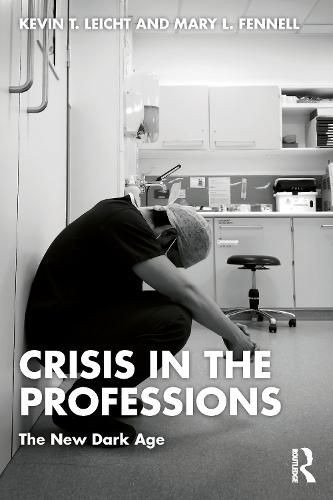Readings Newsletter
Become a Readings Member to make your shopping experience even easier.
Sign in or sign up for free!
You’re not far away from qualifying for FREE standard shipping within Australia
You’ve qualified for FREE standard shipping within Australia
The cart is loading…






Crisis in the Professions: The New Dark Age presents a wide, panoramic view into the state of modern professional work in the United States. Struggling labor markets, growing inequalities, and increasing amounts of cultural and political mistrust are but a few major changes undermining the people seen as essential in society and needed to compete in a globalized, highly-skilled world.
The authors explore this profound dilemma through a variety of methods, each one allowing them to identify significant areas of change and concern. They address macro-level social, political, and economic forces at the root of these changes and pair these explanations with illustrative vignettes of young, would-be professionals to paint a comprehensive, albeit complicated picture of professional work in the 21st century. Amid a backdrop of increasing globalization, technological advance, and cultural devaluation of expertise, the authors point attention to the mounting implications these shifts have for new generations of professionals and consider alternative models to address signs of precarity and instability within the professions.
With piercing insight and compelling evidence, The New Dark Age probes deeply enough to stimulate scholars and researchers invested in the sociological study of work and provides a valuable, versatile read for advanced students in these areas as well.
$9.00 standard shipping within Australia
FREE standard shipping within Australia for orders over $100.00
Express & International shipping calculated at checkout
Crisis in the Professions: The New Dark Age presents a wide, panoramic view into the state of modern professional work in the United States. Struggling labor markets, growing inequalities, and increasing amounts of cultural and political mistrust are but a few major changes undermining the people seen as essential in society and needed to compete in a globalized, highly-skilled world.
The authors explore this profound dilemma through a variety of methods, each one allowing them to identify significant areas of change and concern. They address macro-level social, political, and economic forces at the root of these changes and pair these explanations with illustrative vignettes of young, would-be professionals to paint a comprehensive, albeit complicated picture of professional work in the 21st century. Amid a backdrop of increasing globalization, technological advance, and cultural devaluation of expertise, the authors point attention to the mounting implications these shifts have for new generations of professionals and consider alternative models to address signs of precarity and instability within the professions.
With piercing insight and compelling evidence, The New Dark Age probes deeply enough to stimulate scholars and researchers invested in the sociological study of work and provides a valuable, versatile read for advanced students in these areas as well.